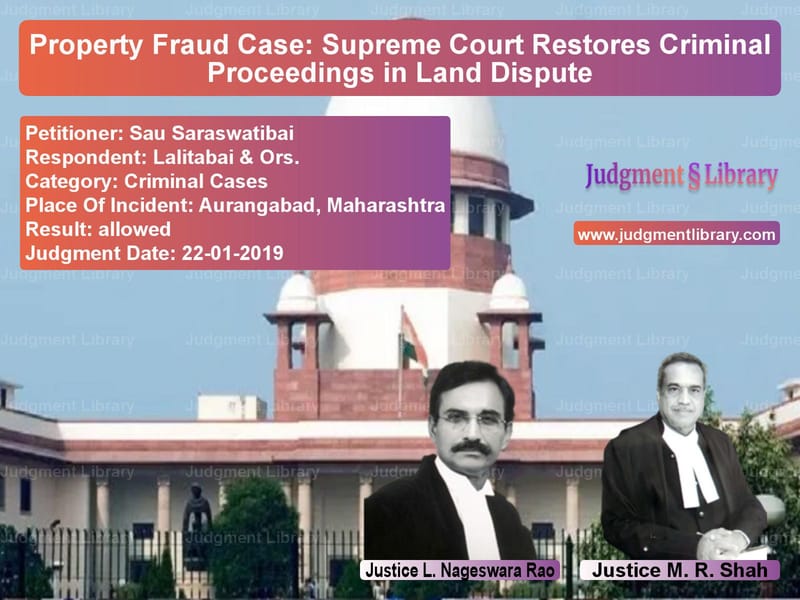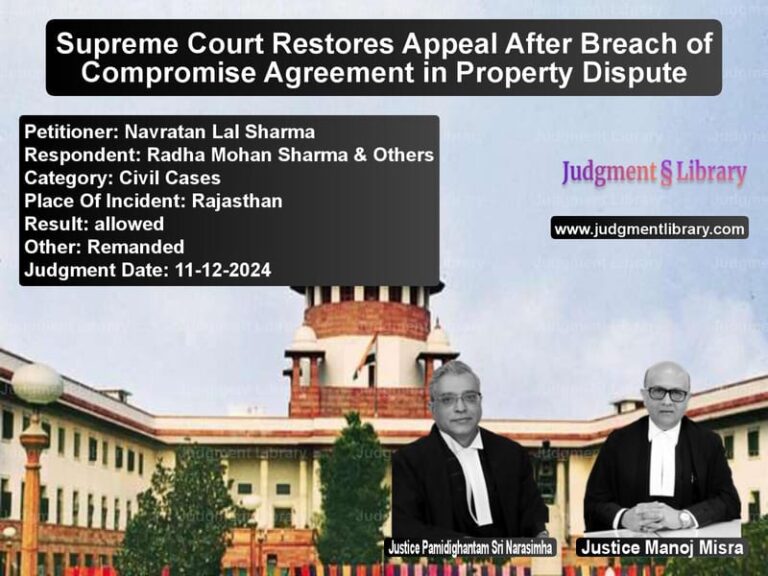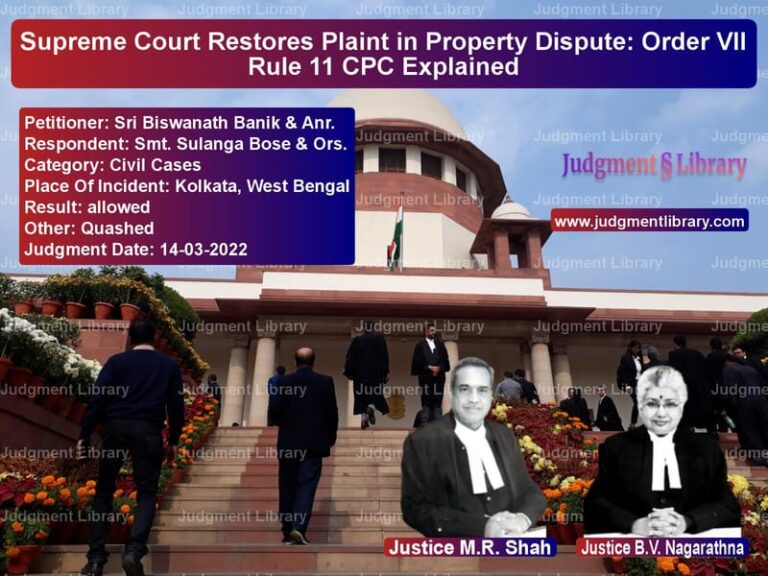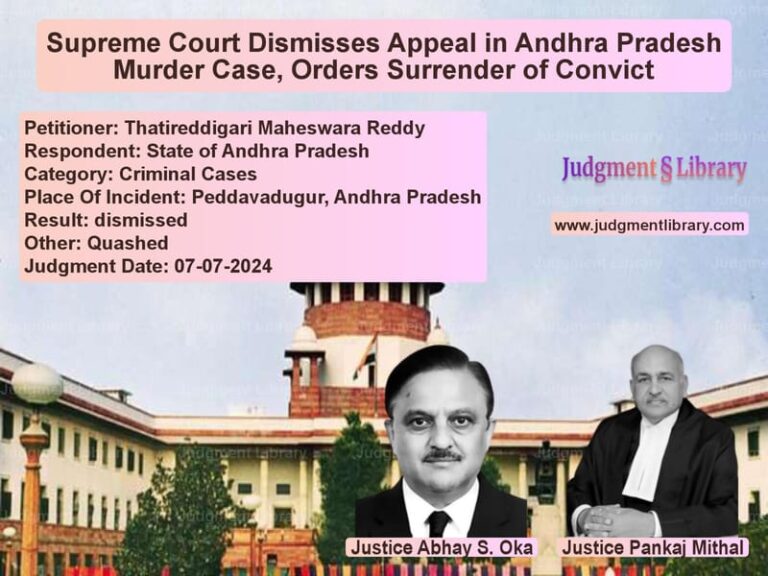Property Fraud Case: Supreme Court Restores Criminal Proceedings in Land Dispute
The case of Sau Saraswatibai vs. Lalitabai & Ors. is a significant judgment concerning property fraud and criminal proceedings under the Indian Penal Code. The Supreme Court of India, in its ruling, overturned the decision of the Bombay High Court, which had earlier quashed the criminal proceedings initiated against the accused. The dispute revolved around allegations of property fraud, wherein the complainant accused the original owner of selling the same plot to multiple buyers by altering its plot number.
The judgment highlights the importance of due legal process in criminal matters and reinforces the principle that High Courts should not exercise their powers under Section 482 of the Criminal Procedure Code (CrPC) in cases where a prima facie case is established.
Background of the Case
The complainant, Sau Saraswatibai, had purchased a plot from the accused (Respondent No. 1) in 2005 via a registered sale deed. However, in 2010, the same plot was allegedly resold to another buyer by altering its plot number. The new buyer was none other than the husband of the original seller, and he subsequently sold the property again in 2011 to a third party.
Key Facts
- The complainant initially purchased the property as “Plot No. 1” in Survey No. 121.
- The accused resold the same plot by renumbering it as “Plot No. 24.”
- The second sale was made to the accused’s own husband, who later transferred it to another party.
- The complainant alleged fraud and filed a case under Sections 420, 464, 465, 467, 468, 471, and 34 of the Indian Penal Code.
Legal Proceedings
Trial Court and Investigation
Upon receiving the complaint, the Magistrate ordered an investigation under Section 156(3) of the CrPC. The police registered an FIR, and after investigating, they submitted a Final Report under Section 173 of the CrPC, concluding that the accused had committed the alleged offenses.
High Court’s Decision
The accused approached the Bombay High Court, seeking to quash the FIR under Section 482 of the CrPC. The High Court, despite the Final Report indicating prima facie evidence against the accused, quashed the entire criminal proceeding. The reasoning was primarily based on a statement from the complainant’s counsel, who mistakenly suggested that Plot No. 1 was distinct from Plot No. 24. Later, the complainant attempted to withdraw this statement, but the High Court refused.
Supreme Court’s Observations
The Supreme Court, upon reviewing the case, found several flaws in the High Court’s reasoning and ruled that the criminal proceedings should not have been quashed.
The Court noted:
“The High Court did not examine the Final Report on its merits and instead relied solely on a statement from the complainant’s counsel, which was later retracted. This approach was erroneous.”
Furthermore, the Court emphasized:
“Once the Investigating Officer submits a Final Report under Section 173 of the CrPC concluding that a prima facie case exists, the accused, if aggrieved, should approach the Magistrate for discharge, not the High Court under Section 482.”
Key Legal Issues
Arguments by the Petitioner (Complainant)
- The accused fraudulently sold the same property twice under different plot numbers.
- The High Court erred in quashing the proceedings despite a valid Final Report.
- The complainant’s counsel’s erroneous statement should not have been the sole basis for quashing the case.
Arguments by the Respondents (Accused)
- The two plot numbers were distinct, and there was no fraud.
- The complainant voluntarily withdrew her objections.
- The High Court correctly exercised its powers under Section 482 of the CrPC.
Supreme Court’s Ruling
The Supreme Court ruled in favor of the complainant, setting aside the High Court’s decision and restoring the criminal proceedings. It provided the following key directives:
- The case should proceed as per the law, and the prosecution should continue.
- The High Court’s quashing order was unjustified, as it did not assess the merits of the Final Report.
- The accused can seek discharge before the Magistrate if they believe they are not guilty.
Conclusion
The Supreme Court’s ruling in this case serves as a precedent on the limited scope of High Courts’ powers under Section 482 of the CrPC. It reinforces that when a police investigation has concluded a prima facie case exists, the accused must seek relief from the Magistrate rather than prematurely approaching the High Court.
By restoring the criminal proceedings, the Supreme Court has reaffirmed that procedural fairness and due process must be upheld in criminal matters. This case is a crucial reminder of the judicial responsibility to ensure justice is served by following proper legal channels.
Petitioner Name: Sau Saraswatibai.Respondent Name: Lalitabai & Ors..Judgment By: Justice L. Nageswara Rao, Justice M. R. Shah.Place Of Incident: Aurangabad, Maharashtra.Judgment Date: 22-01-2019.
Don’t miss out on the full details! Download the complete judgment in PDF format below and gain valuable insights instantly!
Download Judgment: Sau Saraswatibai vs Lalitabai & Ors. Supreme Court of India Judgment Dated 22-01-2019.pdf
Direct Downlaod Judgment: Direct downlaod this Judgment
See all petitions in Fraud and Forgery
See all petitions in Landlord-Tenant Disputes
See all petitions in Judgment by L. Nageswara Rao
See all petitions in Judgment by Mukeshkumar Rasikbhai Shah
See all petitions in allowed
See all petitions in supreme court of India judgments January 2019
See all petitions in 2019 judgments
See all posts in Criminal Cases Category
See all allowed petitions in Criminal Cases Category
See all Dismissed petitions in Criminal Cases Category
See all partially allowed petitions in Criminal Cases Category







